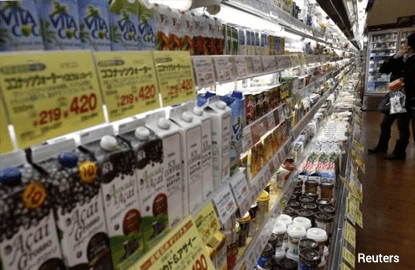
TOKYO (May 27): Japan's core consumer prices fell for the second straight month in April as weak consumption discouraged firms from raising prices, stoking fears of deflation and keeping the central bank under pressure to do more to hit its ambitious inflation target.
The data underscores the fragile nature of Japan's recovery and may give Prime Minister Shinzo Abe justification to delay a scheduled increase in sales tax next year.
A recent Reuters poll added to the gloom with a strong majority of Japanese firms surveyed now expecting no escape from deflation for the foreseeable future.
"We're seeing downward pressure on inflation not only from energy but from food prices," said Yoshiki Shinke, chief economist at Dai-ichi Life Research Institute.
"Both prices and the economy are weak, so expectations for further BOJ easing will heighten," he said.
The nationwide core consumer price index (CPI), which includes energy but excludes volatile fresh food costs, fell 0.3 percent in April from a year earlier, matching the drop in March which was the biggest annual decline in three years.
In a sign price falls will persist, core consumer prices in the Tokyo area - a leading indicator of nationwide tendencies - fell 0.5 percent in May, more than a median forecast for a 0.4 percent drop, government data showed on Friday.
Some analysts warned that Japan may be reverting back to deflation, despite Premier Shinzo Abe's stimulus policies to eradicate sustained price declines, including three years of aggressive money printing by the BOJ.
"The (CPI data) marks a change in the price trend and is a sign Japan is reverting back to deflation," said Junichi Makino, chief economist at SMBC Nikko Securities, adding that the BOJ may ease policy at next month's rate review.
BACK TO DEFLATION?
The BOJ stunned markets in January by adding negative interest rates to its massive asset-buying programme in a fresh effort to accelerate inflation to its 2 percent target.
But the move has failed to brighten public sentiment or arrest an unwelcome rise in the yen that hurts exports and weighs on inflation by pushing down import costs.
Anaemic inflation has forced the BOJ to push back the expected timing for hitting its price target to around early 2018, though many analysts say even the new forecast is too ambitious given slow wage growth and a sluggish economy.
The BOJ hopes a moderate economic recovery will keep boosting corporate profits, allowing firms to increase wages and nudge consumers into spending more. Robust consumption will allow companies to raise prices and help accelerate inflation.
Last year, some companies passed on rising import costs from a weak yen on households. That trend has subsided this year due to the yen's rebound and weak consumer demand, analysts say.
A restaurant chain serving "gyudon" beef rice bowls - a symbol of Japanese deflation because of intense competition - began offering cheaper "butadon" pork rice bowls after price hikes hit sales.
The BOJ insists that such examples are a minority and that the current weakness in inflation is due to the temporary effect of recent oil price falls.
But a separate index calculated by the BOJ to strip out the effects of energy and fresh food prices showed inflation stalled at 1.1 percent in March after accelerating steadily last year. The April figure will be released at 2 p.m. (0500 GMT).
Japan's economy narrowly averted recession in the first quarter of this year and many analysts expect it to barely grow in the current quarter as weak emerging market demand weighs on exports and tame wage growth hits household spending.